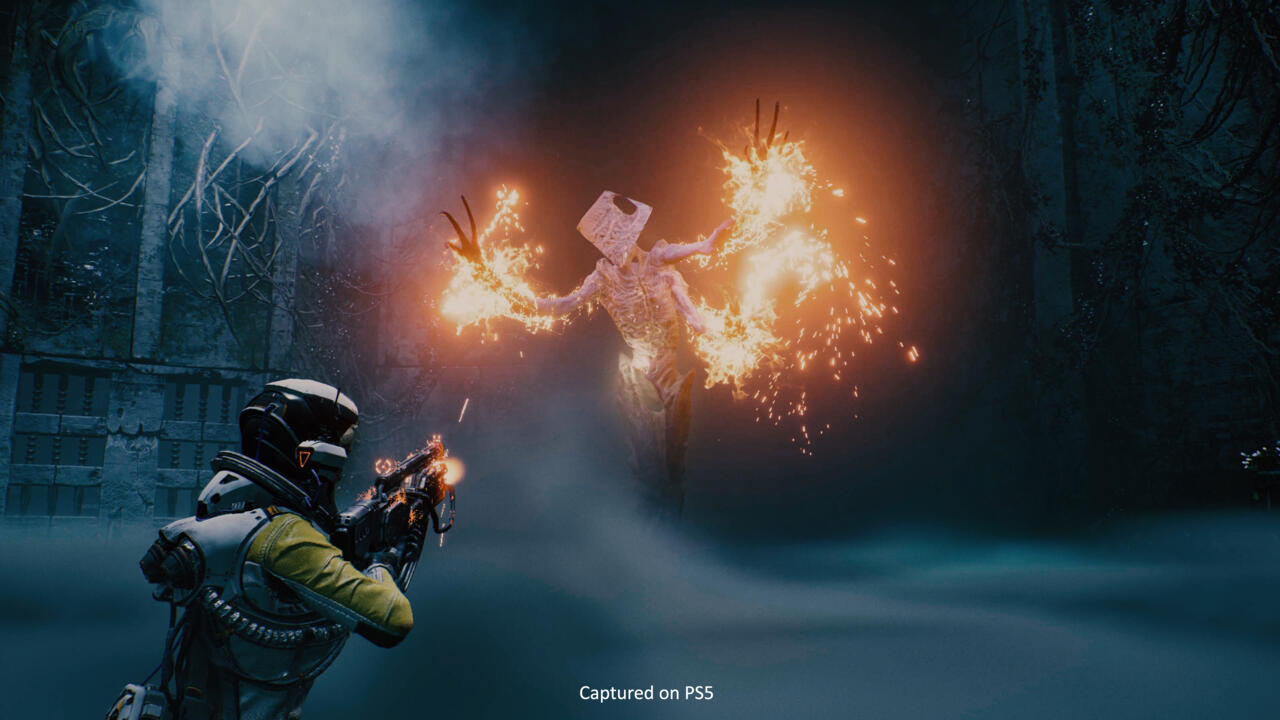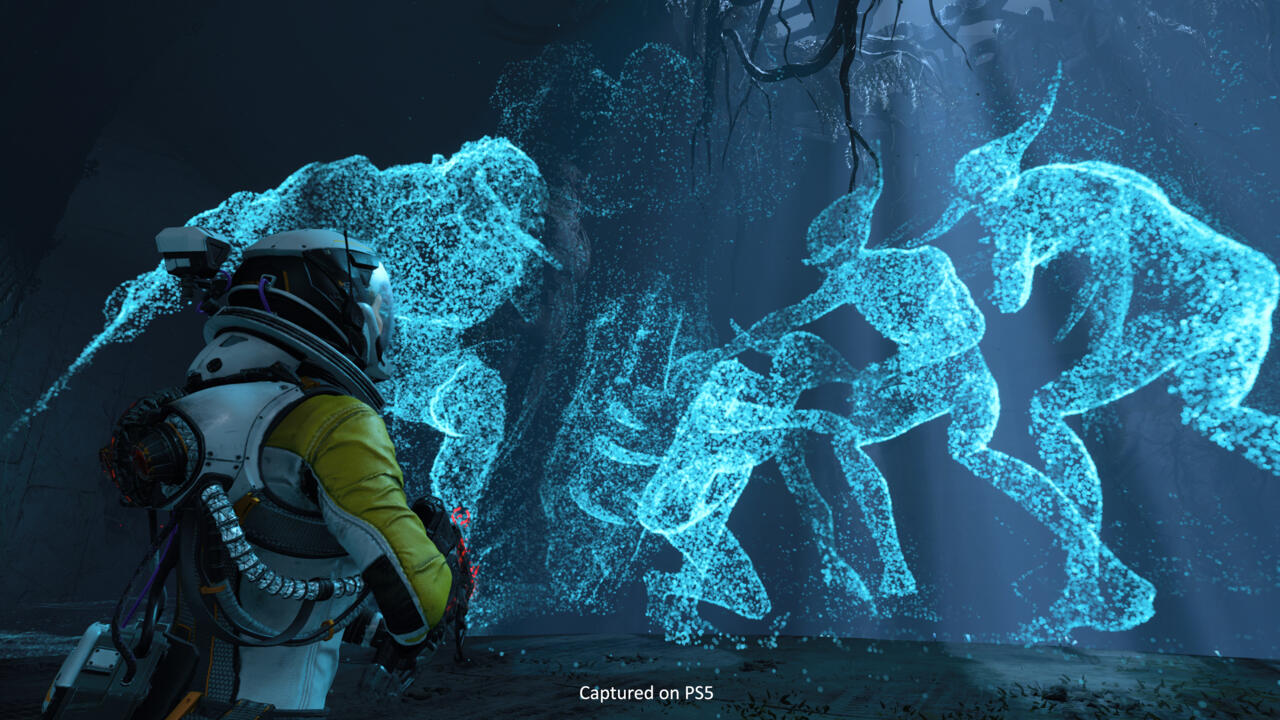Housemarque's Returnal is a new roguelike that leans into the developer's pedigree for arcade-style shooters, yet it also has something to say about the effects of being trapped in isolation and in a perpetual cycle. Following an emergency landing on the planet Atropos, the game's protagonist Selene finds herself stranded on a planet filled with ancient ruins and hostile monsters. After meeting her seemingly inevitable end, she re-awakens shortly after the crash, retaining memories of her past attempt at survival. Selene is forced to relive the day again and again until she can uncover why she's trapped in a time loop, and why the strange world seems to have a growing attachment to its new visitor.
Ahead of its April 30 launch, I had the chance to view an extended preview of the game in action and also spoke with game director Harry Krueger and narrative director Gregory Louden about Returnal's scope. During the preview, I noticed that Returnal adds a Metroid-style sense of action and exploration to its time-looping roguelike structure. I was surprised to see that the game uses its conceit to showcase Selene's unsettling descent into a mysterious, sentient world that always seems to be two steps ahead of her.
Enter The Void
The roguelike sub-genre has seen a significant surge in recent years, and 2020's Hades was a breakthrough that demonstrated that a meaningful and poignant story with a personable cast of characters can have an impact within a structure that is inherently random. Returnal operates in the same territory as Hades, and with each run, Selene not only expands her powers and knowledge of the planet Atropos, but it in turn reveals more about the protagonist's past, even forcing her to confront visions and constructs that evoke memories of what she left behind before her arrival.
Returnal follows the familiar formula of a roguelike. At the start of each attempt--which presents a new procedurally generated layout for the planet--you'll need to secure resources, power-ups, and boost Selene's abilities in order to face increasingly more difficult enemies and make it to the end of your 'run.' You begin with a standard side-arm and basic abilities from Selene's space-suit, but defeating elite monsters and unearthing hidden tombs will yield new alien weapons and buffs that greatly increase your chances of survival across the planet's different zones. In some cases, you can find parasites that can attach themselves to Selene's suit, adding in simultaneous buffs and debuffs to her stats.
The loop of Returnal takes some cues from classic Metroid. Each zone gradually unravels as you acquire more abilities and attention to detail with its unraveling plot that runs deeper with each attempt at escaping the planet. The look and design of Returnal give off similar vibes from sci-fi films like Prometheus and Solaris, by way of the time-bending action-thriller Edge of Tomorrow. Returnal's design and aesthetic wears its cosmic horror influences on its sleeve, and while there's an eerie atmosphere, there's something still alluring about the journey. According to the game's director, the themes that hinge on psychological horror were always at the forefront of the team's mind.

"We have this theme of answering the "call of the void," and that's one of the many psychological elements that we are playing with throughout the game," said Krueger. "In some ways, we think that the planet of Atropos is in many ways a character in itself. Every time that Selene dies, she re-awakens, and the planet is then entirely different. Is she starting to imagine some of these things, or is this planet just toying with her sanity? These are the kinds of questions and pathways that we'd like for players to take, leading to their own interpretations so that they can solve the puzzle and put together all the missing pieces as they play the game more. It was definitely a really exciting opportunity for us to be combining this multilayered narrative with our trademark and the gameplay values as well."
Housemarque's roguelike doesn't deviate much from the established setup. Yet, Returnal's gameplay does hinge on the twitch-reflexes found in their previous games, which gives this game a different cadence than most of its contemporaries. While some battles can be cleared with ease, the more challenging fights can turn into bullet-hell-style encounters, with enemies littering the battlefield with energy blasts and explosive orbs. During the extended gameplay demo, I watched Selene fight against a group of aliens that ambushed her after she found a secret room filled with old relics. During combat, the enemies fight in both ranged and close-quarters, and Selene will be able to evade attacks with her suit's dashes and double jumps. While the end of each run kicks you back to the beginning, there are persistent upgrades that boost Selene's abilities and give you a sense of progression in her journey.
Exploring The All-Knowing Planet
Scattered throughout the planet are bits of environmental storytelling and visions that reveal more about Atropos' history and why it can reconfigure itself with each reset of the run. But there are also sets of audio logs to find, and they seem to be directly related to Selene's journey. Selene can review these audio logs, which contain messages from herself from a possible past run, or from another attempt that has yet to happen. In one message, this alternate Selene describes killing a hostile version of herself, and she's unsure if it's another manifestation from the planet, or was a genuine Selene trying to survive like her. It's an unnerving concept, and it highlights the unpredictable nature of exploring Atropos.
In one of the demo's defining moments that really cemented the game's focus on narrative, Seline encounters an unusual sight when exploring Atropos. After entering a new area, Selene spots an abnormal structure placed amongst the ruins of the alien landscape; an old two-story house. To us, it's an old home that's ordinary and has seen better days--but to Selene, it's familiar. This house, along with other hallucinations and narrative events, are randomized with each run. After entering the house, the game transitions to a first-person view to focus more on exploring the home. Exploring the house gave me similar feelings to that of P.T., which slowly revealed more of Selene's past trauma and anxieties. While there weren't any jump scares, it still comes across as unsettling.Its closing sequence, which sees an unknown astronaut observing Selene at a distance, shows that there's more to expect from these spaces in the coming runs.

There's a conscious effort to keep players on edge, even when they've gotten used to running and gunning throughout Returnal. According to Returnal's narrative director, Housemarque plans to keep the mystery going for each subsequent run.
"Every time you play, the world changes: enemy positions, the environment, it adapts within the handcrafted levels that we have [created]," said Louden. "We also have the corpses you can find that basically have glimpses of both the future and the past that you can begin to decipher and understand. I'd say for us, how do we do this within a roguelike premise within a Housemarque game? It was something that we wanted to feel like it was new and fresh. Then, on top of that, have a story that survives repetition. Ideally, our goals were to create something mysterious and haunting. Haunting in a sense of not horror, but haunting in a sense that it's a story you keep replaying in your mind and stays with you."
Closing The Loop
As game director Harry Krueger stated, Returnal's journey is about "answering the call of the void" to accomplish Selene's main goal of ending the time-loop and escaping Atropos. I've personally found most roguelikes' experience to be difficult to engage with, yet the alluring nature of Returnal's larger mystery and its fast-paced combat does catch my interest. What I think is interesting about Returnal's take, aside from looking like a cool and fun action roguelike, is that it's using its time-loop conceit as a core narrative device.
How Selene contends with this loop and Atropos' many variations is all up to you. Just when you get settled into one variation and defeat its boss, a new zone will open up. Towards the end of the demo, I saw a glimpse of the Crimson Wastes, a desert-like setting that's far removed from the swamps Selene previously explored. Once you unlock zones, you can freely travel to them right at the beginning of the run without needing to complete the previous areas again. But according to the devs, simply unlocking all the zones and beating the bosses won't complete the larger story. With death and rebirth being the continuing cycle, it will take more runs and defeats to piece together everything.
Housemarque's Returnal is a significant departure from the developer's previous 2D 'bullet-hell' games. Yet, it still leans into the developer's experience with fast, twitch-based shooting to act as a means to highlight the terrifying nature of being trapped in a perpetual loop that's on an alien world. It's an interesting mix of concepts and themes, and it's something that I hope will manage to stick the landing once it's released on April 30.









